International Choral Competition ‘Ave Verum’, Baden bei Wien
An Auspicious Motet!
Andrea Angelini, ICB Managing Editor, conductor and teacher
The name Baden immediately brings to mind imperial and upper-middle-class life in the 18th century. It was at this time that so many musicians usually spent a period of rest, lulled by leisure and the sweet life of the spa. Baden is still that small romantic city, close enough to Vienna to almost smell its fragrance; its historic center is surrounded by gentle hills, while its spa facility stands tall amidst a lush park.
It is not difficult, then, to imagine how the young Wolfgang Amadeus found here the right inspiration for his famous motet Ave Verum Corpus, K618. Mozart wrote this brief piece for choir, strings, and organ in the summer of 1791 – the manuscript bears the date June 17 to be exact – in Baden where he had joined his wife Constanze, busy with spa treatments. The composition originated because he was in debt to Anton Stoll, who directed the local choir; and in order to settle things, Mozart dedicated the Ave Verum to him so that it could be performed in Baden’s parish church during the celebration of the Corpus Domini. Certainly the importance of the piece goes far beyond that which its slight dimensions would lead one to believe; for the Ave Verum, together with the Mass in C minor, K427/417° and the Requiem K626, is one of the few sacred compositions that Mozart wrote in the last years of his life. (These two scores, as we know, were both left incomplete.)
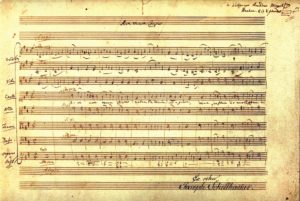
In the light of these considerations it would have been difficult – not to say most regrettable – if Wolfgang Ziegler, President of the Festival, had produced a flop the first time round. Well then, let’s check out this Festival.
It’s impossible to get lost in Baden: its historic core is enclosed in a square space just a few hundred meters on each side. The most pleasant part was perhaps observing how the participating choristers took over the streets, the plazas, the shops, and the park, providing a many-hued splash of color thanks to the great variety of their traditional costumes.
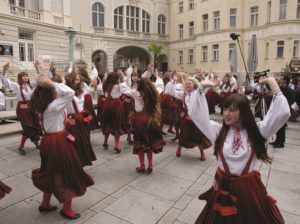
There were groups from Norway, Austria, Estonia, Germany, Argentina, the United States of America, Belarus, Sweden and Hungary. After a small but significant welcome ceremony held by the Mayor for the choir directors, the members of the jury and other guests, the Festival began properly with the official inauguration held at the Spa Park Pavilion. Here the participating choirs were ‘musically honored’ by their Austrian regional host counterparts, a sort of choral twinning which was a friendly way of saying, “We’re here for you, good luck!” It was followed by a superb concert by the Austrian choir CantAnima, fireworks, and a curious welcome party at the famous local casino where the attendees drank champagne with the croupiers: from sacred to profane in the space of half an hour!
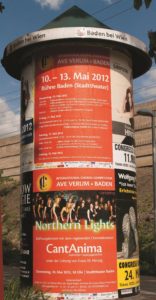
The next day saw the start of the competition, held at the city theatre. Wolfgang Ziegler advocates putting all the choirs in just one category; I personally have some reservations about this, but this is nevertheless better than seeing, as happens in some competitions, an excessive number of categories, some of which may have just one choir taking part. The jury was truly outstanding, with the participation of Erwin Ortner (President), Vytautas Miskinis, Karmina Šilec, Heinz Ferlesch, Maria Goundorina and Robert Sund.
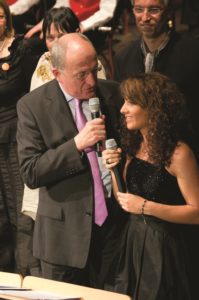
The repertoire presented by the choirs was beautiful and varied, including some rather difficult pieces. There was no compulsory programme, but choirs were required to include pieces from different periods. When the first round of the competition came to an end, the ‘Long Night of Choral Music’ began at St Stephen’s church, concluding with the awarding of a prize to the choir chosen by the audience. This part was perhaps the most original of all the events since the organizers had alighted on the idea of grouping the pieces sung by the choirs into three thematic sections, with the titles ‘concerto capriccio’, ‘concerto furioso’ and ‘concerto cantabile’.
Sunday was the last day. The weather was not as good as on the preceding days: great black clouds appeared to remind us that May is not August, and that the previous day’s summery temperatures were now nothing but a memory. I found myself wondering if Mozart too took shelter in the same café as me, while penning the last lines of the piece that was to pay off his debt. While waiting for the rain – which soon arrived – I called to mind another illustrious figure who amused himself composing music in this oasis of bon vivre. Beethoven had the happy thought of emulating his predecessor and increasing Baden’s fame by writing what was to become the European anthem: Freude, schöner Götterfunken! The people of Baden are proud to remind the unsuspecting tourist all of this, but do so with a delicacy of feeling and a degree of tact that I, as an Italian, am not accustomed to. Speaking for them are the thousands of packages of Mozartkugeln, the famous little chocolates, which catch one’s eye in every shop window: I have even seen them in hardware stores. The presence of Mozart and of Beethoven is decidedly discreet.
The second part of the competition features a freely chosen repertoire. Some of the choirs are a little more nervous; maybe they think that victory is within their grasp; others are decidedly outsiders and sing in a more relaxed way and to the best of their ability. In any case, there is a good level overall. Finally, night falls on the awards ceremony and the announcement of the winners.
The theatre is full to the brim for the closing ceremony; fortunately I have a reserved seat in the front row close to my friend Vytautas, with whom I exchange opinions on the quality of the choirs. After the greetings by the authorities present and the singing of Ave Verum by the entire audience (the Austrians all know it), comes the long awaited announcement: “And the winner is… Musica Quantica from Argentina!”
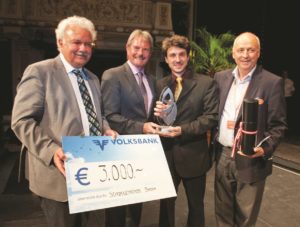
The exclamation from the row reserved for the Argentine singers is deafening. Camilo Santostefano, the director, is already up on stage lifting the trophy high above him; he resembles a soccer star, like his compatriot, who has long played in the ranks of an Italian club. I won’t name names because it’s not my club! Joking apart, I believe that the jury really awarded the prize to the best group in the competition, a group which courageously presented a very varied and difficult repertoire (with pieces by Gesualdo da Venosa, Pizzetti, Whitacre, Pamintuan) with satisfactory fidelity to each style.
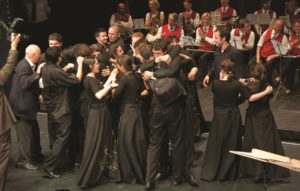
The second and third places, respectively, went to the Estonian Ellerhein Girls Choir and to the Austrian Frauenkammerchor Cantilena.
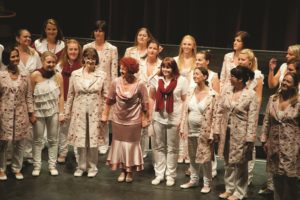
Wolfgang…..Ziegler (not Mozart, this time) can truly be content at the end of the day: if – as the Italian proverb says – a good beginning makes a good ending, then the next festival will surely be another well-deserved success!
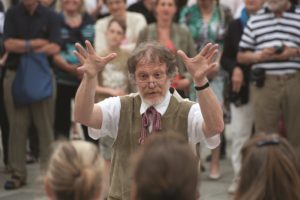
Translated by Aaron Kircher, USA
Edited by Gillian Forlivesi Heywood, Italy